Gladio CIA Cicilian Slaughter - MI6 basra - Turkey 2008
http://en.wikipedia.org/wiki/Operation_Gladio
A short and important history lesson on the ACTUAL methods of the CIA:
YES.. slaughter of innocent civilians... yes... its true, there is 100% proof!
A long held tradition, a tool of the criminal intelligence-mafia-agencies. Compare with the incident where MI6 undercover agents tried to plant a bomb in a crowded market but were caught redhanded by the Iraqis in Basra:
http://u2r2h-documents.blogspot.com/2007/07/uk-carnage-attempt-in-basra.html
Now, under a less corrupt MORAL-driven AKP government .. Turkey is getting rid of the CIA-paid murderers:
a good article from UAE:
www.thenational.ae/article/20080829/REVIEW/607415999/-1/ART
The National - Abu Dhabi,United Arab Emirates
Party of one
August 29. 2008 11:38AM UAE / August 29. 2008 7:38AM GMT
It’s our party: AKP supporters celebrate the party’s victory in a court case challenging its legitimacy. Reuters
Two turbulent, violent years that looked liable to topple Turkey’s ruling party have instead left it stronger than ever, Cihan Tugal writes.
The past two years have been turbulent ones in the Republic of Turkey, with assassinations, destabilising mass demonstrations, controversial parliamentary and presidential elections and the revelation of a series of conspiracies. Two recent court cases – one challenging the legitimacy of the governing Justice and Development Party (AKP), the other prosecuting an underground network of violent secular ultranationalists – may look like extensions of this era of turbulence. But it is more likely that they signal its end.
At the centre of this drama lies the AKP, the “moderate Islamic” party that controls the parliament, the government and the presidency. Its ascendancy can be seen as the unintended consequence of official manoeuvring: after 1980, a military government took steps to fund and support some Islamic organisations in an attempt to pre-empt the reemergence of a leftist movement that had threatened the state in the 1970s. But by the 1990s, this policy had clearly backfired. A social justice-orientated Islamic mobilisation from below, organised by the Welfare Party (RP), started to threaten the western orientation of the Turkish state and the peaceful functioning of the free market. Another military intervention in 1997 closed down Islamic parties and associations. But in 2001, pro-western conservatives broke off from the Islamist movement to establish the AKP.
Unlike the RP, the AKP is pro-US and pro-EU, favours a free-market economy and gives measured support to democracy. It identifies itself as conservative rather than Islamist. Encouraged by this reformation, many non-Islamist politicians (liberals, reformed right-wing nationalists and social democrats) joined the AKP. Liberal intellectuals of all stripes (from Islamists to socialists), seeing no alternative democratic force in the country, became public voices for the party’s policies.
While the liberal wing of the secular establishment was happy with the split in the Islamist movement, hard-line secular nationalists could not accept the AKP’s rise to power. The consolidation of AKP rule after a sweeping electoral victory in 2007, along with the election of a president – Abdullah Gül – whose wife wears a headscarf, further enraged the nationalists.
Hundreds of thousands of nationalists took to the streets in a series of mass demonstrations, shouting authoritarian slogans and denigrating Kurds and Arabs. Paramilitary gangs distributed ethnic hate literature directed at Christian missionaries and Kurds. The demonstrations attacked the US and EU alongside the AKP, and the nationalist forces pressed for an alliance between Turkey, Russia, China and Iran against the West. In January of that year, the Armenian journalist Hrant Dink was murdered in broad daylight by a teenaged ultranationalist, and three Christian missionaries were tortured and brutally murdered. While the military remained silent in the face of these killings, elements in its high command indicated their approval of the anti-AKP demonstrations and increasingly anti-American public sentiment.
In March 2008, secularist prosecutors filed a case in the constitutional court aimed at disbanding the AKP and barring its 71 top figures from politics for five years. The prosecution accused the party of organising “anti-secular” activities. But AKP supporters contend that the suit against the party, the anti-government street-demonstrations and the assassinations have all been the work of a so-called “deep state” organisation of hard-line secular nationalists, known as Ergenekon.
In July, pro-AKP prosecutors struck back with a 2500-page case against 86 people said to belong to the Ergenekon network – including retired generals, journalists and activists – alleging a plot to overthrow the government as well as involvement with the killings of Christian missionaries and a priest.
At the end of July, the court case against the AKP failed by one vote. Instead of shutting down the AKP, the court cut public funding for the party and issued a warning against it. Some liberal AKP supporters, strangely enough, looked kindly on the punishment – they had been alarmed by the party’s recent attempts to criminalise adultery and ban alcohol in municipalities under its control.
The Ergenekon case will not be concluded so quickly, as it involves deeper and more complicated issues. The network has been compared to the “Gladio” in Italy, one of several counter-guerrilla organisations established in Nato countries in the 1950s to fight back in the event of a communist takeover. Such an organisation did indeed exist in Turkey, but whereas in other European nations these groups were dismantled by the early 1990s, in Turkey the “deep state” was reorganised to fight Kurdish nationalism and remnants of the socialist left. Some have seen its fingerprints on thousands of extrajudicial killings of pro-Kurdistan Workers Party (PKK) figures in the East and a handful of leftist activists in the West. The Ergenekon prosecution, however, targets only those hardline ultranationalists who threaten the AKP; those involved in the war against the Kurds remain mostly untouched.
The Ergenekon case, with its emphasis on military elements, steers clear of the police, though they have been integral to these extralegal operations since the 1970s, as seen most recently by their links to figures involved in the Hrant Dink assassination. In the pre-AKP era, it was top military officers who were above the law, but today top police officials seem to have taken their place.
The trial – which has captivated Turks with its unending string of apparently sensational revelations – has had a chilling effect on political debate. Anyone who questions the Ergenekon prosecution is quickly lumped in with pro-coup extremists; AKP supporters insist that journalists and intellectuals who raise doubts about the case have secret ties with the military, come from military families, or are covert racists. Unions and newspapers resisting the westernizing free-market policies of the AKP are now attacked as “secret Ergenekon”.
There is cause for concern that this signals the emergence of a “soft totalitarian” order. In the old days, opponents would be physically liquidated. Now they can be marginalised by baseless association with Ergenekon.
Now that the court case against the AKP has failed, there is no longer any force preventing the party from taking near total control of the political field. All the legitimate voices are joining the AKP bloc — those who remain outside are either marginal or powerless. Politics from now on will probably be shaped within this bloc, not as a conflict between two or more major parties. Future generations might witness a democracy resembling Cold War-era Japan, where a conservative party is in essence the only game in town, though other parties participate without taking power.
In short, while these two court cases have been seen internationally as a deepening of Turkey’s recent instability, they actually indicate the growing strength of the Turkish centre. The result is neither a liberal sea change in Turkish politics (e.g. the final triumph of democracy and the end of the Turkish Gladio) nor a step towards an Islamic state. Instead, recent developments have solidified the direction the Turkish state has taken since the 1980 military coup: toward a religiously conservative (rather than Islamic) state with a strong free-market tendency and ever stronger ties to the West. Not all secularly-minded people are being purged from the bureaucracy and civic arenas – but those who challenge and oppose this dominant tendency have been marginalised decisively.
The significance of this moment is not limited to Turkey. This is still a test of moderate Islam within a democracy – and, for that matter, of the ability for an Islamist-led state to be integrated into a US-led world market.
American diplomats and experts, as well as academics in Europe, have pointed to Turkey as an example of compatibility between Islam and democracy. The failure of the court case against the AKP has ratified their arguments: a democratically elected Islamic party has weathered an authoritarian storm. At the same time, the Ergenekon case is in the process of weeding out potential sources of instability and anti-western sentiment within the state.
But both trials have created an atmosphere where the Washington consensus cannot be questioned publicly: it has become an unacceptable sin to criticise the free market or Turkey’s alliance with the US. Pro-American forces in the country were divided over the last two years, but now many of the wounds have healed. Some prominent secular pro-American journalists have shifted positions to become supporters of the AKP. The nationalist wing of the military has also changed its stance, after (allegedly) flirting with Ergenekon-style pro-Russian and pro-Chinese ideas for a couple of years. The high command handed over retired generals suspected of being linked to the Ergenekon to the police. After the apparent fluctuations of the last two years, the high command remains committed to the US and the EU, and thus supportive of the AKP.
To the relief of those who have looked to Turkey as a safe ally of the West and a front-line state against Islamic radicalism and anti-western nationalism, pro-western actors look more likely to emerge more unified from these years of turbulence. Despite harbingers of doom in 2007, Turkey’s AKP, the global test case for moderate Islam, is poised to remain in control for the foreseeable future.
Cihan Tugal teaches sociology at the University of California, Berkeley. His book Passive Revolution: Absorbing the Islamic Challenge to Capitalism will be published by the Stanford University Press in 2009

Caught red-handed
Nafeez Ahmed
BRITISH UNDERCOVER OPERATIVES IN IRAQ
Zarqawi Eat Your Heart Out
Basra is relatively stable compared to central Iraq where violence involving insurgents, civilians and coalition forces is a daily routine. The city has rarely been a site of clashes between insurgents and coalition troops, nor is it a victim of regular terrorist attacks. This week, however, things changed, but not thanks to Zarqawi and his al-Qaeda ilk.
On Monday, two British soldiers were arrested and detained by Iraqi police in Basra. Within a matter of hours, the British military responded with overwhelming force, despite subsequent denials by the Ministry of Defence, which insisted that the two men had been retrieved solely through "negotiations."
British military officials, including Brigadier John Lorimer, told BBC News (9/20/05) that the British Army had stormed an Iraqi police station to locate the detainees. Ministry of Defence sources confirmed that "British vehicles" had attempted to "maintain a cordon" outside the police station.
After British Army tanks "flattened the wall" of the station, UK troops "broke into the police station to confirm the men were not there" and then "staged a rescue from a house in Basra", according a commanding officer familiar with the operation. Both men, British defence sources told the BBC's Richard Galpin in Baghdad, were "members of the SAS elite special forces." After their arrest, the soldiers were over to the local militia.
What had prompted this bizarre turn of events? Why had the Iraqi police forces, which normally work in close cooperation with coalition military forces, arrested two British SAS soldiers, and then handed them over to the local militia? A review of the initial on-the-ground reports leads to a clearer picture.
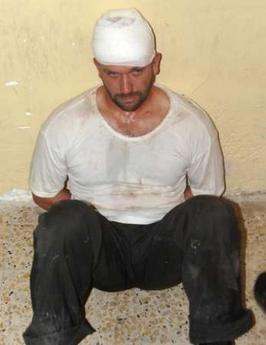
Fancy Dress and Big Guns Don't Mix
According to the BBC's Galpin, reporting for BBC Radio 4 (9/20/05, 18 hrs news script), Iraqi police sources in Basra told the BBC the "two British men were arrested after failing to stop at a checkpoint. There was an exchange of gunfire. The men were wearing traditional Arab clothing, and when the police eventually stopped them, they said they found explosives and weapons in their car…It's widely believed the two British servicemen were operating undercover."
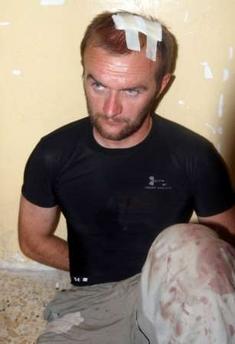
Undercover? Dressed as Arabs? What were they trying to do that had caught the attention of their colleagues, the Iraqi police?
According to the Washington Post (9/20/05), "Iraqi security officials on Monday variously accused the two Britons they detained of shooting at Iraqi forces or trying to plant explosives." Reuters (9/19/05) cited police, local officials and other witnesses who confirmed that "the two undercover soldiers were arrested after opening fire on Iraqi police who approached them." Officials said that "the men were wearing traditional Arab headscarves and sitting in an unmarked car."
According to Mohammed al-Abadi, an official in the Basra governorate, “A policeman approached them and then one of these guys fired at him. Then the police managed to capture them.”
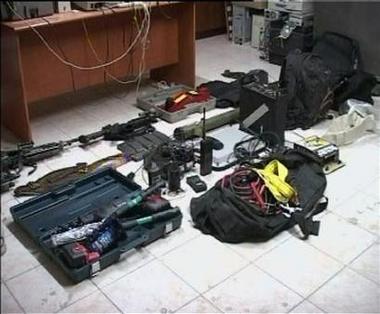
Booby-trapped Brits?
In an interview with Al Jazeerah TV, the popular Iraqi leader Fattah al-Sheikh, a member of the Iraqi National Assembly and deputy official in the Basra governorate, said that police had "caught two non-Iraqis, who seem to be Britons and were in a car of the Cressida type. It was a booby-trapped car laden with ammunition and was meant to explode in the centre of the city of Basra in the popular market." Contrary to British authorities' claims that the soldiers had been immediately handed to local militia, al-Sheikh confirmed that they were "at the Intelligence Department in Basra, and they were held by the National Guard force, but the British occupation forces are still surrounding this department in an attempt to absolve them of the crime."
The Special Reconnaissance Regiment and British Covert Operations
British defence sources told the Scotsman (9/20/05) that the soldiers were part of an "undercover special forces detachment" set up this year to "bridge the intelligence void” in Basra, drawing on 'special forces' experience in Northern Ireland and Aden, where British troops went 'deep' undercover in local communities to try to break the code of silence against foreign forces."
These elite forces operate under the Special Reconnaissance Regiment and were formed last year by then defence secretary, Geoff Hoon, "to gather human intelligence during counter-terrorist missions."
The question, of course, is how does firing at Iraqi police while dressed as Arabs and carrying explosives constitute "countering terrorism" or even gathering "intelligence"?
The admission by British defence officials is revealing. A glance at the Special Reconnaissance Regiment gives a more concrete idea of the sort of operations these two British soldiers were involved in.
The Regiment, formed recently, is "modelled on an undercover unit that operated in Northern Ireland" according to Whitehall sources. The Regiment had "absorbed the 14th Intelligence Company, known as '14 Int,' a plainclothes unit set up to gather intelligence covertly on suspect terrorists in Northern Ireland. Its recruits are trained by the SAS."
This is the same Regiment that was involved in the unlawful July 22 execution - multiple head-shots - of the innocent Brazilian, Mr. Jean Charles de Menezes, after he boarded a tube train in Stockwell Underground station.
According to Detective Sergeant Nicholas Benwell, member of the Scotland Yard team that had been investigating the activities of an ultra-secret wing of British military intelligence, the Force Research Unit (FRU), the team found that "military intelligence was colluding with terrorists to help them kill so-called 'legitimate targets' such as active republicans... many of the victims of these government-backed hit squads were innocent civilians."
Benwell's revelations were corroborated in detail by British double agent Kevin Fulton, who was recruited to the FRU in 1981, when he began to infiltrate the ranks of IRA. In his role as a British FRU agent inside the IRA, he was told by his military intelligence handlers to "do anything" to win the confidence of the terrorist group.
"I mixed explosive and I helped develop new types of bombs," he told Scotland's Sunday Herald (6/23/02). "I moved weapons… if you ask me if the materials I handled killed anyone, then I will have to say that some of the things I helped develop did kill… my handlers knew everything I did. I was never told not to do something that was discussed. How can you pretend to be a terrorist and not act like one? You can't. You’ve got to do what they do… They did a lot of murders… I broke the law seven days a week and my handlers knew that. They knew that I was making bombs and giving them to other members of the IRA and they did nothing about it… The idea was that the only way to beat the enemy was to penetrate the enemy and be the enemy."
Most startlingly, Fulton said that his handlers told him his operations were "sanctioned right at the top… this goes the whole way to the Prime Minister. The Prime Minister knows what you are doing."
more:
http://u2r2h-documents.blogspot.com/2007/07/uk-carnage-attempt-in-basra.html
THE MYSTERIOUS DEATH OF THE BASRA PRISON BREAK INVESTIGATOR CAPTAIN KEN MASTERS, CHIEF OF BRITISH POLICE, ON OCT 15 2005
Documentation (27):
---
Captain Ken Masters, British chief police investigator in Basra died under mysterious circumstances. The cause of death was not mentioned. According to a Ministry of Defense spokesman, his death was "not due to hostile action" nor to natural causes.
Ken Masters was Commanding Officer of the Special Investigation Branch of the Royal Military Police. He was "responsible for the investigation of all in-theatre serious incidents, plus investigations conducted by the General Police Duties element of the Theatre Investigation Group." (Statement of Britain's Ministry of Defense, 16 Oct 2005).
In this capacity, Captain Masters was responsible for investigating the circumstances of the arrest of two undercover elite SAS men, wearing Arab clothing, by Iraqi police in Basra. on September 19 (London Times (17 Oct 2005)..
"The Ministry of Defence refused to reveal details about his [Masters] work but it is believed he was involved in the inquiry into the dramatic rescue of two SAS soldiers held in a prison in Basra." (Daily Mail, 16 Oct 2005)
The two British undercover "soldiers", who were driving a car loaded with weapons and ammunition, were subsequently "rescued" by British forces, in a major military assault on the building where they were being detained:
"British forces used up to 10 tanks " supported by helicopters " to smash through the walls of the jail and free the two British servicemen."
The incident, which resulted in numerous civilian and police casualties has caused political embarrassment.
Several media reports and eyewitness accounts suggested that the SAS operatives were disguised as Al Qaeda "terrorists" and were planning to set off the bombs in Basra's central square during a a major religious event.
On the 14th of October, Britain formally apologized to Iraq and confirmed that it "will pay compensation for injuries and damage caused during the storming by the army of a police station in Basra in the operation to release two SAS soldiers" (The Scotesman, 15 Oct 2005). In the British raid on the prison, 7 Iraqis were killed and 43 were injured .(The Times, op cit)
"Compensation to the families of alleged Iraqi victims who died during the fracas depended on the official investigation being carried out by Captain Masters and his team." (ibid)
Captain Ken Masters died in Basra on the 15th. According to the MoD "the circumstances (of his death) were not regarded as suspicious."
The reports casually suggested that Masters might have been suffering from "stress", which could have driven him to commit suicide. In the words of a Defense analyst quoted by the BBC:.
"Capt Masters was part of quite a small outfit and his job would have been quite stressful. It's quite an onerous job..... I think, (there is) quite a lot of stress involved" (BBC, 16 October 2005).
The Daily Mail (17 Oct 2005), however, tends to dismiss the suicide thesis "Little is known of his private life and it is said to be unlikely that the pressures of work would have led him to commit suicide."
---
The car the SAS agents used, was a white Toyota Cressida (28). The "Death Car", which Steven Vincent wrote about in "Switched Off in Basra", was a "white Toyota Mark II".(26)
A Toyota Cressida and a Toyota Mark II is one and the same car. (29)
Stephen Vincent was kidnapped by a "white police truck" in Basra, before he got murdered.
Wednesday, October 19, 2005
Basra Shadowlands
Sarah Meyer, Index Research
Part I: Basra Timeline 2005
Part II: Mark Curtis, Web of Deceit and the SAS
Part III: Some Questions
Appendix : Blair Fiction Fog (posted 7/10/05)
On October 1st 1918, Lawrence of Arabia led the Arabs into Damascus in an armoured car. “Damascus salutes you, “ said a rider, flourishing his head-dress. “Multitudes of Syrians thronged the streets to celebrate liberation from the Ottoman Empire.”
More
1. Basra Timeline 2005
Buildup
There was no such welcome greeting for the armoured tanks in Basra, known as the ‘station of death' whilst the Iraqis were celebrating during the Karbala religious festival in September 2005.
There was an air of tension. Recent attacks on Westerners --
once a rare event in Basra -- had targeted British and U.S. diplomatic convoys and killed at least eight Britons and Americans.
Since the increase in attacks against UK forces two months ago, a 24-strong SAS team has been working out of Basra to provide a safety net to stop the bombers getting into the city from Iran.
In the early morning of the 19th, Fakher Haider,
an Iraqi journalist and photographer working for the NY Times, was found dead on the outskirts of Basra. Earlier, on 2 August, Steven Vincent, another journalist, was kidnapped and killed in Basra, allegedly after being taken away in a marked police car. Vincent had criticized UK security forces. More
A British official blamed Islamists. More
In an interview between Al Jazeera TV’s Anchorman Al-Habib al-Ghurayb and Fattah al-Shaykh, Al-Shaykh spoke of the background to the events of 19 September 2005: “There have been indiscriminate arrests, the most recent of which was the arrest of Shaykh Ahmad al-Farqusi and two Basra citizens on the pretext that they had carried out terrorist operations to kill US soldiers. This is a baseless claim.”
Sheikh Hassan al-Zarqani, a spokesman for Moqtada al-Sadr, said "We called a protest outside the mayor’s office on Monday (the 19th) demanding the Sheikh be released," Sheikh Hassan said. "This protest was peaceful."
Two Arrested Men
Fattah al-Shaykh continued : “the sons of Basra caught two non-Iraqis, who seem to be Britons and were in a car of the Cressida type. It was a booby-trapped car laden with ammunition  and was meant to explode in the centre of the city of Basra in the popular market. However, the sons of the city of Basra arrested them. They [the two non-Iraqis] then fired at the people there and killed some of them. The two arrested persons are now at the Intelligence Department in Basra, and they were held by the National Guard force, but the British occupation forces are still surrounding this department in an attempt to absolve them of the crime.”
and was meant to explode in the centre of the city of Basra in the popular market. However, the sons of the city of Basra arrested them. They [the two non-Iraqis] then fired at the people there and killed some of them. The two arrested persons are now at the Intelligence Department in Basra, and they were held by the National Guard force, but the British occupation forces are still surrounding this department in an attempt to absolve them of the crime.”
On the 19th of September 2005, Xinhuanet News repeated the story with some rewording, specifically that the car was “packed with explosives.”
Sheikh Hassan al-Zarqani, a spokesperson for rebel Shia cleric Moqtada al-Sadr,
explained why in another interview, two British soldiers had been arrested in Basra: ".. Events in our city took a sinister turn when the police tried to stop two men dressed as members of the Mehdi Army (al-Sadr’s militia) driving near the protest. The men opened fire on the police and passers-by. After a car chase they were arrested." The photographs of the two men,
The photographs of the two men,
with their faces blocked out, 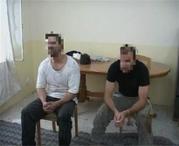
appeared on British television.
A note appeared at the bottom of the screen:  "ATTENTION EDITORS - THE BRITISH GOVERNMENT REQUESTS THAT THE IDENTIFICATION OF THIS MAN IS NOT REVEALED, EITHER VIA PIXELLATION OF THEIR FACES OR BY NOT PUBLISHING THE PHOTOS."
"ATTENTION EDITORS - THE BRITISH GOVERNMENT REQUESTS THAT THE IDENTIFICATION OF THIS MAN IS NOT REVEALED, EITHER VIA PIXELLATION OF THEIR FACES OR BY NOT PUBLISHING THE PHOTOS."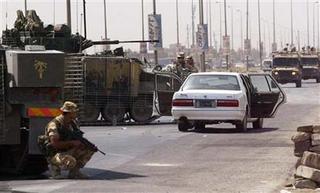 The white Toyota car, was later removed by the British. The BBC said that the gear in the car was ’standard kit’ for British special forces.’
The white Toyota car, was later removed by the British. The BBC said that the gear in the car was ’standard kit’ for British special forces.’
The men were detained at the police station for questioning by a judge.
They were carrying a a plastic-coated card, ’ the only document found on the men. The card read in English: "In an emergency, please call US and UK forces on these numbers." There were phone numbers for the cities of Amara, Nassiriya and Basra."
According to Iraqi MP Ali Dabagh, the militiamen from the outlawed Madhi Army of Muqtada al-Sadr wanted the soldiers as hostages to exchange for two of their leaders arrested on Sunday by British forces.
That afternoon the British army came in tanks and armoured cars demanding the two be released. Lee Watson,  20, said he had driven through walls and over vehicles to get to them. There were “6 SAS people” in the back of his Warrior tank. He added, “They looked like computer characters with shotguns, machine guns, pistols and knives.” However, the two British men were not in the jail. Watson continues, "The helicopter gave us directions and we followed, stormed the street, rescued the two guys and got out. They had been battered half to death but were OK. They thanked us for saving their lives and two choppers came down and away they all went." More
20, said he had driven through walls and over vehicles to get to them. There were “6 SAS people” in the back of his Warrior tank. He added, “They looked like computer characters with shotguns, machine guns, pistols and knives.” However, the two British men were not in the jail. Watson continues, "The helicopter gave us directions and we followed, stormed the street, rescued the two guys and got out. They had been battered half to death but were OK. They thanked us for saving their lives and two choppers came down and away they all went." More
A policeman, Abbas Hassan, told Reuters that a tank cannon struck a room where a policeman was praying." He was standing next to mangled cars outside the police station and jail that he said were crushed by British military vehicles. "This is terrorism. All we had was rifles."
BBC News: Video and Audio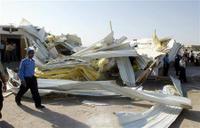 Brigadier John Lorimor, commander of the 12th Mechanized Brigade, made a full statement, in which he said that "Minor damage was caused to the prison compound wall and to the house in which our two soldiers were held." More
Brigadier John Lorimor, commander of the 12th Mechanized Brigade, made a full statement, in which he said that "Minor damage was caused to the prison compound wall and to the house in which our two soldiers were held." More
The British Defence Ministry later admitted their intentional breach.
An Iraqi television cameraman who lives across the street from the jail said about 150 Iraqi prisoners also fled as British troops stormed inside and rescued their comrades. More
Blowback The arrests sparked protests after British troops, backed by tanks, attempted to free the soldiers from the police station. (6 –12) other tanks, as well as helicopter gunships, were nearby. More
The arrests sparked protests after British troops, backed by tanks, attempted to free the soldiers from the police station. (6 –12) other tanks, as well as helicopter gunships, were nearby. More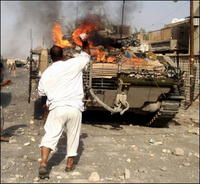 Two British armoured vehicles were attacked by a crowd, angered by the earlier arrests of two Basra citizens. Reuters television footage showed two British armoured personnel vehicles sent to the station attempting to reverse away from the crowd as it came under attack. As flames engulfed the vehicles, one soldier was seen scrambling from a top hatch, as he was pelted with stones and set on fire.
Two British armoured vehicles were attacked by a crowd, angered by the earlier arrests of two Basra citizens. Reuters television footage showed two British armoured personnel vehicles sent to the station attempting to reverse away from the crowd as it came under attack. As flames engulfed the vehicles, one soldier was seen scrambling from a top hatch, as he was pelted with stones and set on fire.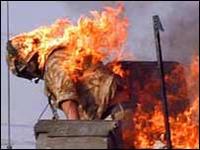
Mohammed al-Waili, the governor of Basra province, condemned the British for raiding the prison, an act he called "barbaric, savage and irresponsible"
"This is an irresponsible act," al-Waili said, adding that the British force had spirited the prisoners away to an unknown location. They were later released.
In an interview on Syrian TV, also on the 19th, Nidal Zaghbur spoke with his colleague in Baghdad, Ziyad al-Munajjid. Al-Munajjid said: “this incident gave answers to questions and suspicions that were lacking evidence about the participation of the occupation in some armed operations in Iraq. Many analysts and observers here had suspicions that the occupation was involved in some armed operations against civilians and places of worship and in the killing of scientists. “
Denouement
On Tuesday, 20 September, in a Reuters release Alaa Habib writes: “Residents of Basra, in a region with Iraq's biggest oil reserves, called on British troops to leave the country. ‘It is unappropriate for any Iraqi to be insulted by a British or an American or any other occupier, we reject the occupying forces,’ said Abbas Jassim. … "What the two Britons did was literally international terrorism … If the British had condemned this, it would have calmed the situation but instead they came and demanded them back which sets a dangerous precedent," Ali al-Yassiri, an aide to Sadr, told Reuters.
The Reuters report continues. At the Baghdad press conference, Haider al-Ebadi, an adviser to PM Ibrahim Jaafair, said, “It is a very unfortunate development that the British forces should try to release their forces the way it happened," Al-Ebadi also said that the two men “were acting very suspiciously like they were watching something and collecting information in civilian clothes in these tense times,"
In the same report, Brigadier John Lorimer, the British commander, said: "From an early stage I had good reason to believe the lives of the two soldiers were at risk," (see above, exchange of prisoners)
On Wednesday, 21 September, al Jazeera reported that about 300 Iraqis, including police officers in uniform, have demonstrated in the southern city of Basra. British forces made no attempt to control them … demonstrators carried banners calling for the return of the two British agents to face Iraqi justice. They also demanded the resignation of the provincial police chief, accusing him of being an agent of the British. "The British promised us sovereignty. So where is this sovereignty if they destroy a police station?" asked one demonstrator.
Also on 21 September, it was announced that Basra officials, following the British raid, had decided to boycott British troops. "All regular meetings between the governorate and British troops have been cancelled and we will not allow British soldiers into the governorate building or any other public office in Basra," Nadim al-Jaabari, spokesman for the provincial governor," told AFP on Thursday. More
On 21 September, alarmed by the focus on the UK SAS disaster, the Media started,
without investigation, to parrot spin about Iranian "insurgents" on the Iraq border. This "news" escalated during the following week.
On 22 September, Mohammed al-Waili told Reuters: "The governing council met yesterday and decided to stop all cooperation with the British until they meet three demands, To apologise for what happened, to guarantee that it does not happen again, and … to provide some compensation for all the damage they did during the operation," he said. The Reuters report continues: “British troops meanwhile confined themselves to their barracks in and around Basra, lowering their profile in an effort to tamp down tensions caused by Monday's raid.”
On 23 September, Adrian Blomfeld reported from Baghdad that
an Al-Sadr official said that the staged bombings were aimed at starting an ethnic war. More
On 24 September, 'Judge Ragheb Mohamad Hassan al-Muthafar told The Sunday Times in an exclusive interview that the soldiers were “suspects who attempted to commit a wilful act of murder”. According to the judge, nine people were killed and 14 injured, including two boys aged 13 and 14, when (the protestors) attacked British forces surrounding the police station where the men were detained. The Ministry of Defense is carrying out an investigation.' More
On Saturday 24 September, Reuters’ Abdel-Razzak Hameed reported that “an Iraqi judge has issued arrest warrants for two undercover soldiers of freed British soldiers.”
British military spokesman Major Steve Melbourne: replied: “We are not fully aware of the issue of these warrants…But what I must say is they have no legal basis for the issue of these." ,BBC Audio transcript, 0738
Also on the 24th, a “flurry of rockets was fired at buildings occupied by British troops.”
On 26 September, The Guardian reports that Karen McLuskie, a British diplomat in Basra, commented: “Britain refuses apology and compensation for Iraqis caught up in Basra riots.” More
29 September. British Hand Over Control of Basra More
On October 11th, Britain offers apologies and compensation for damaged buildings and personal injuries which they incurred in Basra following the arrests of the two UK soldiers.
Opinions
Elias Akleh, British Terrorism in Iraq
Ramzy Baroud, Iraq is an Occupied Nation in Revolt
William Bowles, Agents Provacateurs?
Pratap Chatterjee, Ex-SAS Men Cash In on Iraq Bonanza
Robert Fisk, When Nature and Man Conspire to Expose the Lies …
Michael Keefer: Were British Special Forces Planting Bombs in Basra?
Kurt Nimmo, Big Trouble for British Occupation of Southern Iraq
John Pilger, Sinister Events in a Cynical War
Tom Regan, The "Myth" of Iraq’s Foreign Fighters
Mike Whitney, Another Milestone in the War on Terror
Mike Whitney, Iraq: "A Right Rollicking Cock-up"
Researchers Notes
“The SAS involvement in Iraq was discovered on the 30th of January 2005 when an RAF Hercules plane crashed near Baghdad killing then British servicemen after dropping off fifty SAS members north of Baghdad to fight Iraqi guerillas.”
There is a history of occupied countries lacking any form of jurisdiction. This contradicts the ‘democratic’ principles propounded by the occupier. Human rights are systemically incurred - and ignored.
Part II : Mark Curtis, Web of Deceit and the SAS
On the day following Basra vs. The British, I opened the The Web of Deceit by Mark Curtis 1, to where I had left off, ‘Explaining the War Against Terrorism,’ which describes British undercover operations. Following is a summary of what Mark Curtis has written about the SAS, MI5 and MI6. I would like to thank Mark for allowing me to précis parts of his fine book. All quotes in the following sections are from The Web of Deceit, with one exception.
The SAS ‘Killer Squads
“An SAS officer noted: The SAS is the only agency whose job is to go out and zap people.” (p. 97)
Britain set up pseudo-terrorist ‘counter gangs’ in Palestine in the 1940s and Aden in the 1960s.” These consisted of “former terrorists and loyal tribesmen (Aden) led by British officers disguised as locals.” They were sent out in twos and threes to target those suspected of terrorism against British and local targets. (p. 96)
Aden (South Yemen): The SAS set up ‘hit squads’ whilst the RAF bombed villages and crops causing death and the evacuation of thousands. (p. 96)
Afghanistan: Former SAS officers trained Afghan mojahidins from the beginning of Soviet occupation. “Some SAS MI6 conducted ‘disruptive action’. KMS, (a private company) and then the SAS, trained commando units. Some Afghans were disguised and brought for training at a secret spot in Scotland. “Some SAS had back-up roles with the mojahidin.” (pp.62-3) 2 Britain supplied around 600 ‘Blowpipe’ … anti-aircraft missiles (later used by the Taliban) to these very same mojahidin, which shot down not only Soviet aircraft but passenger planes as well. Britain’s MI6 officers also supported and trained Afghan warlords. The CIA and MI6 trained Osama bin Laden’s supporters. The “war on terrorism” is “at least partly a creation of our (US, Saudi, Pakistan and Britain’s) making.” (p. 64)
Iran: The coup putting The Shah into power was arranged by the CIA and MI6.. (p. 310) The SAS “loaned soldiers to the Iranian military to help train the Shah’s special forces for operations against Kurdish guerillas in N. Iran.” MI6 was in contact with the Shah’s intelligence service, SAVAK; some SAVAK officers were trained in the UK in 1957. About 100,000 people were killed by the Shah’s regime. (pp. 313-4)
Northern Ireland: Modern ‘death squads’.
Kurt Nimmo has written an article about the SAS involvement in Northern Ireland. More
North Yemen: MI6 worked with tribesmen to ‘direct the planting of bombs’ at Egyptian military outposts while garrison towns were ‘shot up’ and political figures murdered.’ … MI6 “provided intelligence and logistical support to the rebels.” The rebels failed to dislodge the government. (p. 281)
Malaya: Between 1948 – 1960 a ‘counter-insurgency’ campaign against the Chinese was waged on behalf of rubber interests in the UK.
‘Killer squads’ were used in this brutal colonial war of decapitations, defoliants, detentions, villageisations’ and bombs. SAS squads from Rhodesia served alongside the British. The British declared this war an ‘emergency,’ and (as in the war in Afghanistan/Iraq) thus declared themselves immune from war crimes. (pp. 334 – 345)
Oman: Britain effectively controlled Oman, its oil, and the repressive Sultan. Britain was “therefore responsible for the repression.” (p. 277). There was a rebellion in Northern Oman, during which “the SAS fought a covert guerilla war whilst the UK Royal Air Force engaged in bombing and shelling of rebel villages and strongholds.” The “British ‘success’ was mainly due to inflicting terrifying violence.” The British ridded themselves of this Sultan and he came to live in the Dorchester Hotel.
Their next Sultan had his own personal 4-man SAS. “An SAS unit organized 1000 irregular forces to fight the rebels. Enemy corpses were
dumped in the main market square. (pp. 277 – 280)
Pakistan: SAS trained special Pakistani forces. (p. 62; see Afghanistan)
Palestine: “Squads were given a free hand to kill Jewish terrorists seeking an end to British rule and were able to adopt methods close to those adopted by the Jewish terrorists”… (p. 96)
Rhodesia: “former SAS officers were recruited… by the Central Intelligence Organisation (CIO) in the l970s.” (p. 97)
Zambia: the SAS were involved with bombings and assassinations against Rhodesian nationalists.
MI5, MI6 And Assassinations
“A long history has been buried. British government involvement in assassinating foreign leaders is virtually an elite tradition” (p. 95)
Hoxha, Albanian president, assassination plans by MI6, 1948. (p. 95)
Nasser, in the 1950’s: poisoned chocolate attempt; A SAS hit squad then considered other methods. (p. 95)
Sukarno of Indonesia: evidence of MI6 plot in 1950s. (p. 95)
Colonel Grivas, Cypriot guerilla leader: assassination plans by MI6 in late 1950s. (p. 95)
Dag Hammarskjold, 1959 plane crash: “meetings between MI5, the CIA and a South African military front company and plans to place TNT in the wheel bay of an aircraft.” described in letters. UK governmental denial of this was in a Guardian 1998 article. (p. 95)
Others considered: Chandra Bose India; The Mufti of Jerusalem (1950s) (p. 95)
Obote, Ugandan president: assassination plans by MI6 in 1969. (p. 95)
A bomb in Beirut, 1985, intended to kill Sheikh Fadlallah, the Shia leader, exploded. “Around eighty people were killed, including women and children, and over 200 wounded…The bombing was organized by the CIA and Saudi agents with the assistance of Britain’s MI6. 3 (p. 94)
Milosovic, President of Serbia: MI6 put forward three options for assassination in 1992. 1) with an SAS bomb/sniper ambush; 2) Serbian paramilitary group assassination; 3) road crash, eg. with strobe light. Later, NATO aircraft targeted him during Kosovo war. (p. 96)
The Quadafi Plot, Libya, 1996: MI6 cable revealing knowledge of assassination attempt by ‘one officer and twenty men being trained especially for this attack.’ “Claims that MI6 was in contact with ‘Osama Bin Laden’s main allies in the plot.” Quadafi was not killed; six innocent bystanders were. (p. 97) 4 MI6 paid £100,000 to the group. “Pure fantasy” said Robin Cook. Ben Bradshaw, Foreign Office Minister, later noted in 2002 that “There is no moral distinction between an attacker who kills civilians or parliamentarians and a state that wittingly provides the resources that facilitate such a terrorist attack. 5 (pp. 97-8)
British Torture & The British Army
1971 investigation: "The British found the British army had engaged in the torture of detainees … in counter-insurgency operations in Palestine, Malaya, Kenya, Cyprus, British Cameroons (1960 – 61), Brunei (1963), British Guiana (1964), Aden (1964-67), Borneo / Malaysia (1965 – 66), the Persian Gulf (1970 – 71) and in Northern Ireland (1971)." (pp. 280 – 81)
Footnotes
1. Mark Curtis, The Web of Deceit, Britain’s Real Role in the World, Vintage GB, 2003. Foreward by John Pilger. Back
2. Curtis footnote no. 30, Cooley, Unholy Wars, pp. 95-7, 81 Back
3.Curtis footnote 42, More Back
4. Curtis footnote no. 48: Dorril, MI6, p. 793; Richard Norton-Taylor, ‘Gagging orders issued in MI6 trial, Guardian, 7 October 2002 Back
5. Curtis footnote no. 50: More Back
Part III : Some Questions
Who is killing doctors in Iraq?
Who is killing journalists and photographers in Iraq?
Who is killing Iraqi teachers?
Who is killing Iraqi scientists?
Who shot Juan Torres in Bagram, Afghanistan?
Who are the "insurgents" kidnapping, beating and drugging people, forcing them to set off bombs that kill Iraqi citizens?
Who is being abducted and where are they?
What company is making the infrared bombs being used in Iraq?
Why are governments allowed to continue to commit torture and murder without fear of legal reprisal?
“State sponsored terrorism is by far the most serious category of terrorism in the world today.” (Curtis, ibid., p. 94)
Appendix : Blair Fiction fog
Spin is hypnotically interesting for journalists. The public becomes a ‘willing accomplice’ to the crime. The purpose of spin is to get the media, and thus the world, to take their eyes off the ball. In Basra, the eye was uncomfortably on the ball marked 'Two British Men Arrested.’ The most recent spin headlines in the UK media concern the alleged interference of the Iranian “insurgents” on the borders of Iraq. Bush supports this, being the original instigator of demonizing Iran.
The British SAS have been faffing around the Iranian border for two months.
The dubious Blair accusation about Iranian “insurgents” was first noticed, I believe, by Kurt Nimmo in his blog Media Shifts Attention from SAS Screw Up to Iran on the 21st of September.
Blair Fiction Fog followed the Basra officials' announcement to boycott British troops
Going yet further back, it can also be seen as a response to the Iranian steadfastness to following its nuclear power development.
This Blair-Spin is now reaching epic proportions, with denials from both Iran and Hizbollah.
The accusation is but a part of the plan to make Iran “dangerous”, in the same way as Saddam was “dangerous” with his WMDs.
When the US government feels the spin has seeded, then the (now deleted from Web) DOD nuclear plan of preemptive strike can then be activated. (Document available here)
While God speaks to Bush, we spin along our way, like lemmings, towards the cliff edge.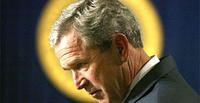 Photo Charles Dharapak/AP
Photo Charles Dharapak/AP
Is the focus by US/UK governments on Iran's 'nuclear weapons buildup' a subterfuge
for a US war on Iran to control its oil? The interference of the UK in matters Iranian continues with Iran Focus writing, on 17 October, that a person admitting to being trained by the British in Iraq was arrested for his part in the twin Ahwaz bombings.
Clearing the Fiction Fog. What information about Iran is now being hidden from the public? There is US/UK sabre rattling about "War in Iran" because of an alleged nuclear 'threat.' Any war in Iran would be for the same reason as the war in Iraq - OIL.
This article by physicist Gordon Prather on 22 October 2005 tells us what we are not being told about 'matters nuclear' in Iran.
FOOTNOTES: January 4 2006. THE US GOVERNMENT DROPS ALLEGATIONS OF IRAN INVOLVEMENT IN IRAQ.
01.04.06. Dominic Kennedy, uruknet. Iranian militiamen were brought in by Britain
DoD Contract, 11.08.06.
Blackwater Security Consulting, Moyock, N.C., was awarded on Aug. 7, 2006, a $7,161,101 firm-fixed-price contract for personal security detail services - protection security services. Work will be performed in Baghdad, Iraq, and is expected to be completed by September 30, 2008. Contract funds will not expire at the end of the current fiscal year. There were an unknown number of bids solicited via the World Wide Web on March 25, 2006, and 21 bids were received. The Joint Contracting Command, Baghdad, Iraq, is the contracting activity (W91GY0-06-C-0027).
Exposing Gordon Kerr and Tony Blair’s secret army
07.04.07. Simon Basketter exposes how special British units in Iraq are run by the same man who commanded death squads in Northern Ireland.
Sarah Meyer is a researcher, living in Sussex, England. She is also a “citizen reporter” for www.mediachannel.org.
email: sarahmeyer@freedom255.com
found on
http://indexresearch.blogspot.com/2005/10/basra-shadowlands.html







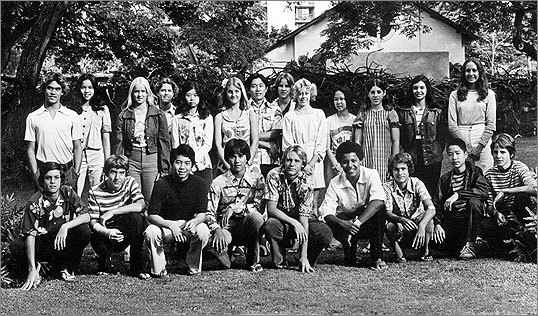

 Earth's magnetic field:
Earth's magnetic field:
